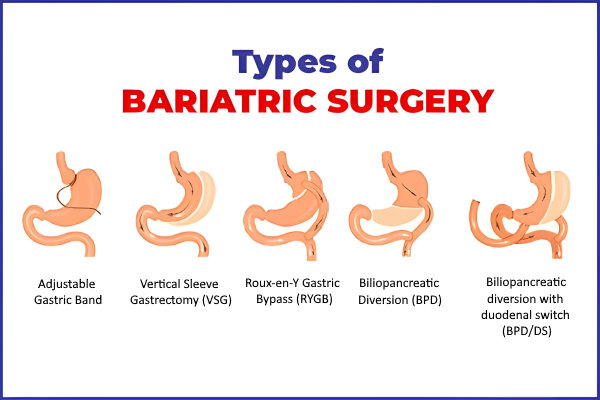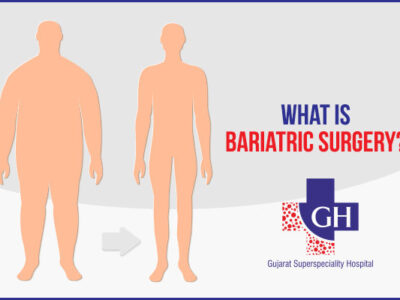Bariatric Surgical Procedures cause weight loss by restricting the amount of food the stomach can hold, causing malabsorption of nutrients, or by a combination of both gastric restriction or malabsorption. Most weight-loss surgeries are performed by minimally invasive techniques.
Bariatric Surgery Options –
You are eligible for Bariatric surgery if the body mass index is –
40 or higher
Between 35 and 40 and you have diabetes, high blood pressure, high cholesterol, fatty liver disease, or sleep apnea.
Between 30 and 35 and you have uncontrolled diabetes.
Doctors perform almost all kinds of Bariatric surgical procedures using minimally invasive techniques, which means smaller incisions and faster recoveries. Most patients go home after surgery and recover in two or three weeks.
Gastric Bypass surgery
It shrinks your stomach on the top part and makes a small pouch there, after which a loop of the small intestine is brought up and connected to that pouch, re-routing the GI tract. When the patient eats food, it enters the small intestine directly and 90-95% of the stomach can be bypassed.
Gastric Bypass is a more powerful tool than sleeve gastrectomy. Patients usually lose 10 to 20 pounds more with it. Rerouting the GI tract leads to some favourable hormonal changes, so the chance of diabetes improvement is higher too.
Advantages –
- Produces significant long-term weight loss.
- Restricts the amount of food that can be consumed.
- May lead to conditions that increase energy expenditure
- Produces favourable changes in gut hormones that reduce appetite and enhance satiety
- Typical maintenance of >50% excess weight loss
Sleeve Gastrectomy Surgery
Also known as the gastric sleeve, Sleeve Gastrectomy surgery involves operating only on the stomach. Surgeons remove around 80-85% of it leaving a smaller sleeve in its place.
It is a bit safer than Bypass surgery. The risk of complications 3% after sleeve and 5% with Gastric Bypass.
Advantages –
- Restricts the amount of food the stomach can hold.
- Requires no foreign objects and no by-pass or re-routing of the food stream
- Involves relatively a short hospital stay of approximately 2 days
- Causes favourable changes in gut hormones that suppress hunger, reduce appetite and improve satiety
Duodenal Switch
During this procedure, bariatric surgeons remove part of the stomach to create the trademark sleeve. Then a more extensive version of gastric bypass surgery is done which gives the potential for even more weight loss and greater metabolic effects.
Patients tend to lose even more weight with Gastric Bypass surgery. It can conquer diabetes too.
Advantages –
- Results in greater weight loss than other bariatric surgeries. I.e. 60-70% excess weight loss or greater, at 5 years follow up
- Allows patients to eventually eat near “normal” meals
- Reduces the absorption of fat by 70% or more
- Causes favourable changes in gut hormones to reduce appetite and improve satiety
- Is the most effective against diabetes compared to other bariatric surgeries.
Gujarat Superspeciality Hospital provides the best Bariatric surgery options. To know more visit our website.

